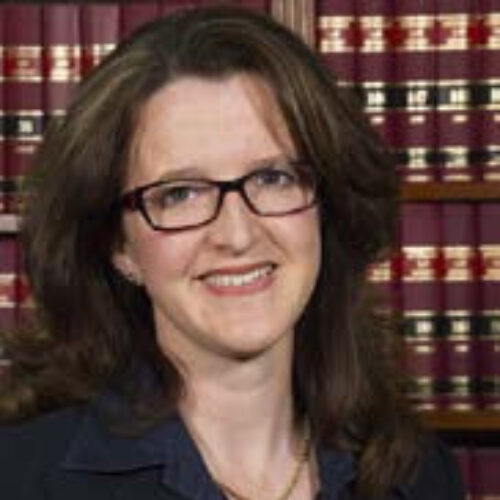- Autumn 2023
- Declarations of invalidity – standing, sufficient interest and utility Ann Bonnor reports on Unions NSW & ors v State of New South Wales (2023) 97 ALJR 150; [2023] HCA 4
Declarations of invalidity – standing, sufficient interest and utility Ann Bonnor reports on Unions NSW & ors v State of New South Wales (2023) 97 ALJR 150; [2023] HCA 4

This case was the fourth of a series of proceedings in the High Court since 2013 concerning the constitutional validity of legislation in New South Wales regulating political donations and expenditure on campaigns for elections.
The plaintiffs sought declarations of invalidity of two provisions as infringements of the constitutionally-implied freedom of political communication. One provision was repealed two weeks before the hearing of the proceedings and the State of NSW accepted that the other provision imposed a burden on the implied freedom and did not seek to justify the burden. In those circumstances the judgments examine and explain questions of standing, sufficient interest and utility to seek a declaration of invalidity of legislation, and jurisdiction and discretion of the Court to hear the plaintiff’s claim with respect to the purported invalidity of the provision that had been repealed.

Background
Each of the plaintiffs was registered under the Election Funding, Expenditure and Disclosure Act 1981 (NSW) (EFED Act) and its successor, the Electoral Funding Act 2018 (NSW) (EF Act) for past NSW State Declarations of invalidity– standing, sufficient interest and utility campaigner (TPC). A TPC is a person or entity other than a political party, associated entity, elected member or candidate, who seeks to participate in a NSW election campaign and incurs over $2,000.
Each plaintiff asserted an intention to be registered as a TPC for future NSW State elections and by elections, and to incur ‘electoral expenditure’ during the ‘capped State expenditure period’ in those elections and by elections. The plaintiffs contended that two provisions of the EF Act governing TPCs impermissibly burdened the implied freedom of communication on governmental and political matters protected by the Australian Constitution, and sought declarations of invalidity in the original jurisdiction of the High Court.
The first provision, s 29(11) of the EF Act, caps TPCs’ ‘electoral expenditure’ to $20,000, indexed for inflation, in the ‘capped State expenditure period’ before a State by-election for the Legislative Assembly. Section 29(11), read with s 33(1), prohibits TPCs from incurring electoral expenditure exceeding that indexed cap.
The second provision, s 35 of the EF Act, made it an offence for a TPC to act in concert with another person/s to incur electoral expenditure in relation to an election campaign during the capped expenditure period that exceeded the applicable cap.
On 28 September 2022 Keane J ordered that a Special Case be stated to the Full Court, asking whether each section was invalid. On 19 October 2022, s 35 of the EF Act was repealed. On 4 November 2022, Kiefel CJ made consent orders for the filing of amended pleadings and a supplementary Special Case. The substantive questions stated for the opinion of the Full Court were:
1. Is section 29(11) of the [EF Act] invalid because it impermissibly burdens the implied freedom of communication on governmental and political matters, contrary to the Commonwealth Constitution?
1A. As to proposed question 2 below: a. Does the Court have jurisdiction to hear and determine the question? b. Should the Court in its discretion hear and determine the question?
2. If the answer[s] to questions 1A(a) and (b) are ‘yes’: was section 35 of the [EF Act], as it stood from 1 July 2018 until 2 November 2022, invalid because it impermissibly burdened the implied freedom of communication on governmental and political matters, contrary to the Commonwealth Constitution?
After a hearing on the Amended Special Case on 16 and 17 November 2022, on 23 November 2022, the Joint Standing Committee on Electoral Matters tabled a report in the State Parliament which contained a finding that s 29(11) was unconstitutional. This led to a further amendment to the Special Case, and the State conceded the first substantive question concerning the invalidity of s 29(11) of the EF Act.
Section 35 of the EF Act
In relation to question 1A, the Court (Kiefel CJ, Gageler, Gordon, Gleeson and Jagot JJ; Edelman J agreeing; Steward J agreeing) held that there was no longer a ‘matter’ within federal jurisdiction with respect to the purported invalidity of s 35 of the EF Act. The judicial power of the Commonwealth is vested by s 71 of the Constitution in the High Court. The extent of the Court’s authority to adjudicate is limited by the Constitution, reflecting notions of the separation of powers and of responsible and representative government, found in the text and structure of the Constitution: at [13].
The giving of answers or the making of declarations is an exercise of judicial power only where arising in or out of the judicial determination of the rights and liabilities in issue in the dispute: at [14]. This is reflected in the constitutional requirement that a dispute involves a ‘matter’ for the purposes of Ch III of the Constitution: at [14].
When the proceedings commenced, before s 35 was repealed, as TPCs whose expenditure and campaigning had been affected by the provision and could be expected to be affected in future elections, the plaintiffs had standing and a sufficient interest to seek a declaration as to the invalidity of s 35: at [23].
That state of affairs changed when s 35 was repealed, following which the plaintiffs could not and did not assert that any of their rights, duties or legal interests had been infringed by the past application of s 35: at [25]. The assertion of invalidity was solely by reference to the implied freedom of political communication, which is not a personal right but, rather, a freedom from unjustified legislative interference: at [25]. At best, the plaintiff’s concern was whether their past compliance with s 35 was necessary, and the only advantage that the plaintiffs would achieve from a declaration of invalidity would be the satisfaction of a statement by the Court validating their contentions of an historical wrong: at [26].
Accordingly, the Court found that it no longer had jurisdiction to hear and determine the plaintiff’s claim with respect to the purported invalidity of the former s 35 of the EF Act. The Court answered question 1A(a) ‘no’, and as a result, it was unnecessary to answer question 1A(b) and unnecessary to consider question 2.
Section 29(11) of the EF Act
The State accepted that question 1 should be answered ‘yes’. While questions of the validity of a law could not be decided by agreement of the parties, the State no longer sought to justify the burden which s 29(11) of the EF Act imposed on communication on governmental and political matters. The polity imposing the burden bears the persuasive onus of establishing that the burden is justified. The provision had not been repealed, and no repeal or amendment of s 29(11) of the EF Act was indicated.
The State accepted by its agreement on the answer to question 1 that there was continuing utility in answering question 1 in that way. Only if this was done and the law declared invalid were the plaintiffs relieved of the purported effect of s 29(11) on their electoral expenditure in future by-elections and the risk of attempted enforcement of that provision. Section 29(11) imposed a burden on the implied freedom and that burden had not been justified.
Accordingly, the majority of the High Court (Kiefel CJ, Gageler, Gordon, Gleeson and Jagot JJ) concluded, question 1 should be answered ‘yes’: at [34]. Edelman J found that it was unnecessary and inappropriate to answer question 1: at [83], [85]. This was because, first, the plaintiff’s interest in the matter was only slight, reduced to the possibility of a concatenation of circumstances with a serious unlikelihood that an answer would have any consequences for the plaintiffs. It was hard to see why the Court would not decline to answer the question as a matter of discretion, given the dramatic reduction in the utility of answering the question: at [64]-[66].
Second, the concession by the State removed the substance of the controversy. Even if s 29(11) was not repealed in the future, which was possible in theory despite the State conceding it to be invalid, it would be strongly arguable that it could be an abuse of process for the State to prosecute the plaintiffs if they were to rely on the concession in their expenditure decisions in a future by-election: at [67]-[68].
Third, there was a prudential consideration of not addressing constitutional questions, particularly issues that have not been argued, when it is unnecessary to do so: at [80]-[82].
Steward J also dissented as to question 1, finding that it was unnecessary to answer, because as a result of the concession made by the State, there was no longer a proper contradictor who retained a true interest to oppose the declaration sought by the plaintiffs: at [90], [94]. BN
